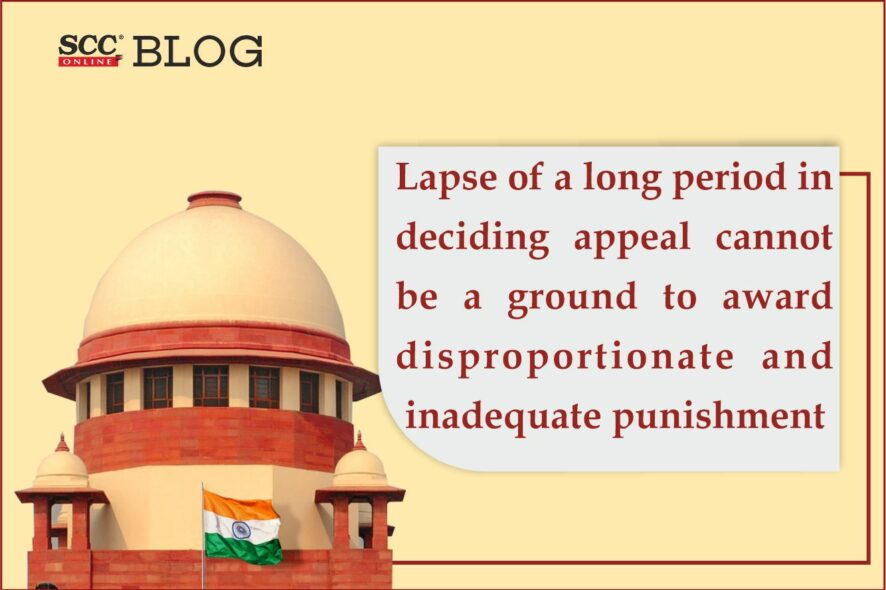Supreme Court: The bench of MR Shah* and BV Nagarathna, JJ has held that merely because a long period has lapsed by the time the appeal is decided cannot be a ground to award the punishment which is disproportionate and inadequate.
Factual Background
The Court was deciding the case where the accused was convicted by the trial Court for the offence under Section 307 IPC for having caused serious injuries on the vital part of the body of the victim/injured and sentenced him to undergo three years’ rigorous imprisonment. In the appeal before the Rajasthan High Court, the accused did not challenge the conviction, but only prayed the Court to reduce the sentence to the period already undergone by him by submitting that occurrence took place on 31.03.1989, i.e., about 26 years ago; that they were facing trial since last 26 years; and when the occurrence took place, they were young and now they are aged persons. The High Court, without any detailed analysis of the facts of the case, nature of injuries caused, weapon used, has simply reduced the sentence to the period already undergone (44 days).
Analysis and Ruling
The Court condoned the delay of 1880 days in preferring the appeal and observed that,
“Merely on the technical ground of delay and merely on the ground that after the impugned judgment and order, which is unsustainable, the accused have resettled in their lives and their conduct has since been satisfactory and they have not indulged in any criminal activity, is no ground not to condone the delay and not to consider the appeal on merits.”
The Supreme Court noticed that, in the present case, the accused could have been sentenced to undergo life imprisonment and/or at least up to ten years, however, the trial Court sentenced the accused to undergo three years rigorous imprisonment. Therefore, as such, the trial Court had already taken a very lenient view while imposing the sentence of only three years’ rigorous imprisonment. Therefore, the High Court ought not to have interfered with the same.
Noticing that the High Court has not at all adverted to the relevant factors which were required to be while imposing appropriate/suitable punishment/sentence, the Court held that the High Court had dealt with and disposed of the appeal in a most cavalier manner. The High Court has disposed of the appeal by adopting shortcuts. The manner in which the High Court has dealt with and disposed of the appeal is highly deprecated.
The Court, further made observation on the manner in which many High Courts are disposing off criminal appeals and said,
“We have come across a number of judgments of different High Courts and it is found that in many cases the criminal appeals are disposed of in a cursory manner and by adopting truncated methods. In some cases, the convictions under Section 302 IPC are converted to Section 304 Part I or Section 304 Part II IPC without assigning any adequate reasons and solely recording submissions on behalf of the accused that their conviction may be altered to Section 304 Part I or 304 Part II IPC. … We deprecate such practice of disposing of criminal appeals by adopting shortcuts.”
Therefore, the impugned judgment and order passed by the High Court reducing the sentence to the period already undergone (44 days) from three years rigorous imprisonment imposed by the trial Court was held to be absolutely unsustainable and was hence, quashed and set aside
“The judgment and order passed by the High Court reducing the sentence is nothing but an instance of travesty of justice and against all the principles of law laid down by this Court in a catena of decisions on imposing appropriate punishment/suitable punishment.”
Restoring the judgment of the Trial Court, the Court directed the accused to surrender before the appropriate jail authority/concerned Court, within a period of four weeks from the date of the judgment, to undergo the remaining sentence.
[State of Rajasthan v. Banwari Lal, 2022 SCC OnLine SC 428, decided on 08.04.2022]
*Judgment by: Justice MR Shah
For accused: Advocate Abhishek Gupta






